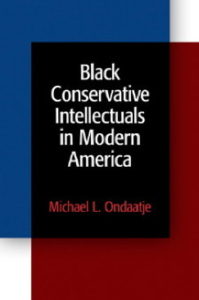
Black Conservative Intellectuals in Modern America
By Michael L. Ondaatje
232 pages
Published Dec. 3, 2009 by Univ. of Pennsylvania Press
A few years ago, I saw a videoclip of Candace Owens in a debate. I was smitten. Her intelligence, conviction, and articulation of certain conservative principles impressed me. So did her good looks. And, yes, she is Black.
Two years ago, I became a fan of Larry Elder, the conservative talk show host and recent candidate for governor of California. Elder, too, is intelligent and articulate. And he’s also Black. He’s not as good looking as Candace Owens. But he has a sense of humor that is very endearing.
Through Owens and Elder, I heard about Thomas Sowell, the economist, historian, and social theorist from Stanford University. Heavy duty public intellectual. And conservative. And Black.
And that got me thinking about Black conservativism in America. Is it a new thing? A growing thing? An important thing?
And those questions led me to Michael L. Ondaatje and Black Conservative Intellectuals in Modern America.
In this scholarly but readable book, Ondaatje chronicles the development of Black conservatism in the United States from the early 1980s to the present. He does so through the lens of three policy issues: affirmative action, welfare, and education. And by focusing on nine influential Black conservatives, including Supreme Court Justice Clarence Thomas, Thomas Sowell, Shelby Steele, and cultural theorist John McWhorter, as well as Condoleezza Rice and Colin Powell.
What I Liked About Black Conservative Intellectuals in Modern America
* The book demonstrates that Black conservatism is hardly a new thing. That it has long roots and a distinguished cast of characters.
* Ondaatje does a careful, analytical job of identifying the commonalities and differences of his subjects. He refutes the popular myth that all Black conservatives subscribe to the same thinking.
Critical Reception
* “A splendid narrative of the rise of Black conservative intellectuals who emerged into the public sphere with the election of Ronald Reagan in 1980…. A first-rate, evenhanded account of Black conservatism that will likely be a pivotal work on the topic for years to come.” (Journal of American History)
* “Thoughtful, well written…. Ondaatje has written a useful assessment of the late 20th century iteration of an important but understudied historical and contemporary intellectual tradition.” (Rhetoric and Public Affairs)
* “Michael Ondaatje has taken on a subject that few have written about so thoroughly and extensively, and his book makes a notable contribution to modern American intellectual history and race relations…. Applying rigorous critical analysis, he also documents their logical failures, intellectual inconsistencies, and suspect arguments.” (Raymond A. Mohl, coeditor of The New African American Urban History)
* “A well-written and important piece of scholarship that aids considerably in historical understanding of Black conservatism in particular and modern American conservatism in general.” (Edward J. Blum, author of W.E.B. Du Bois, American Prophet)
